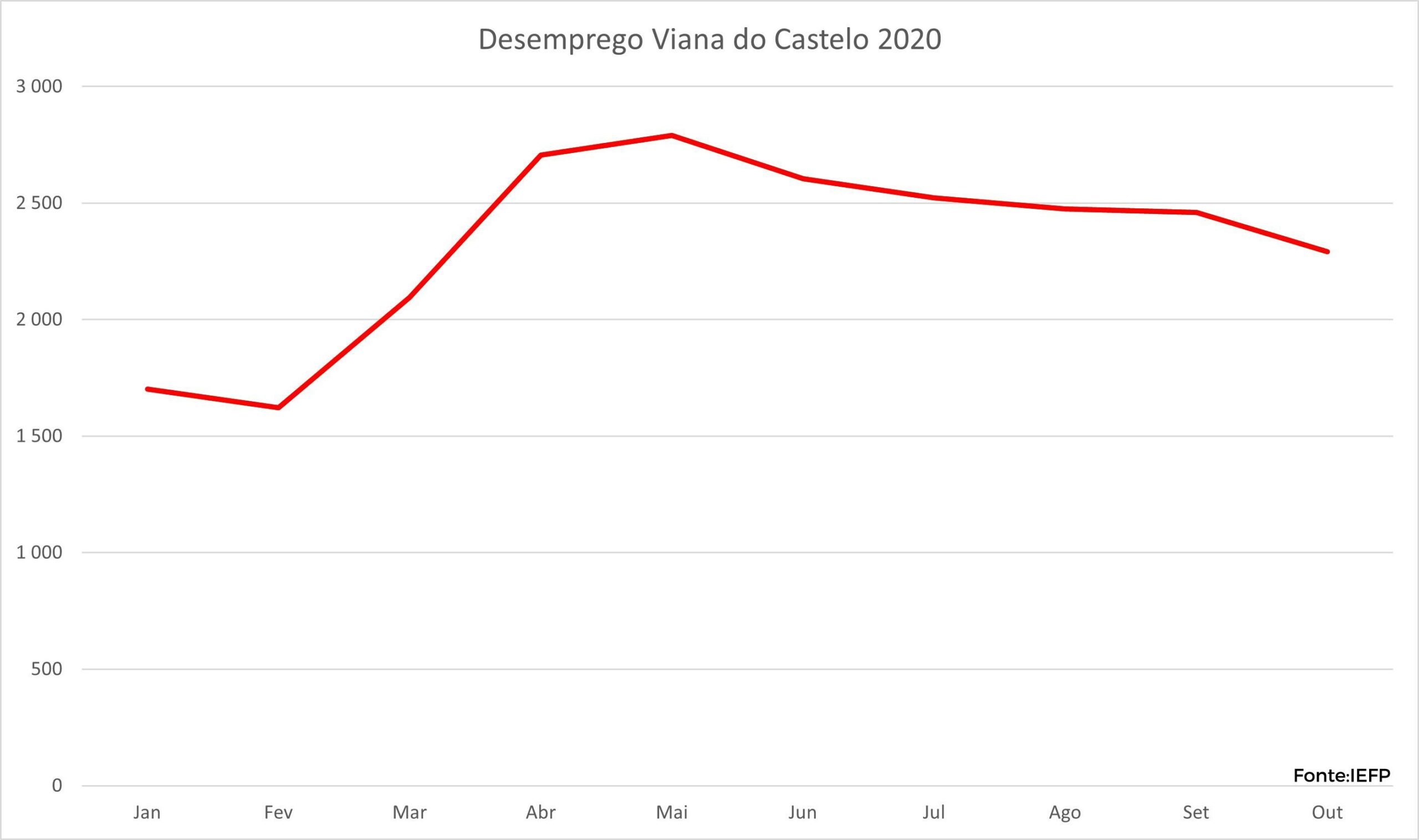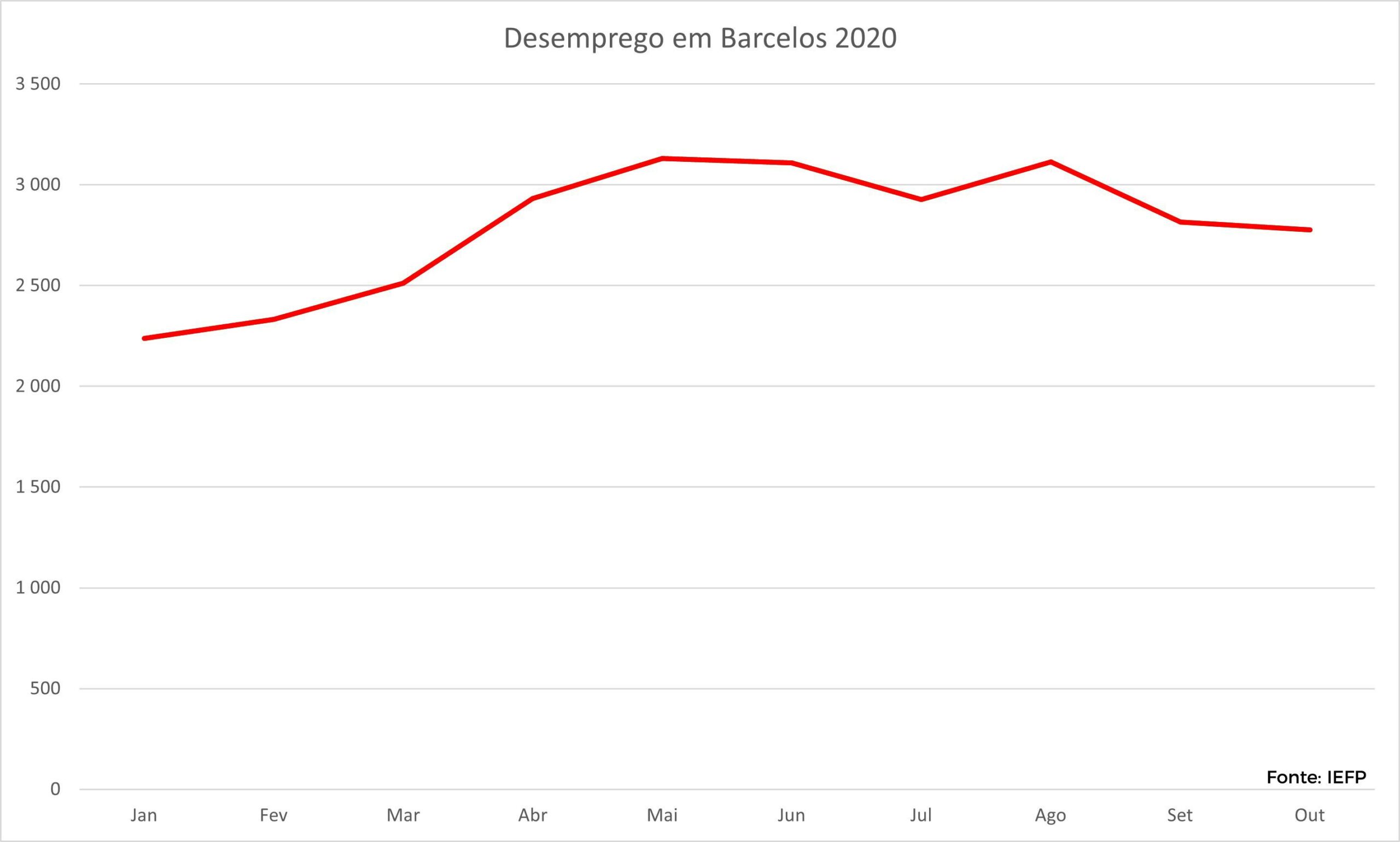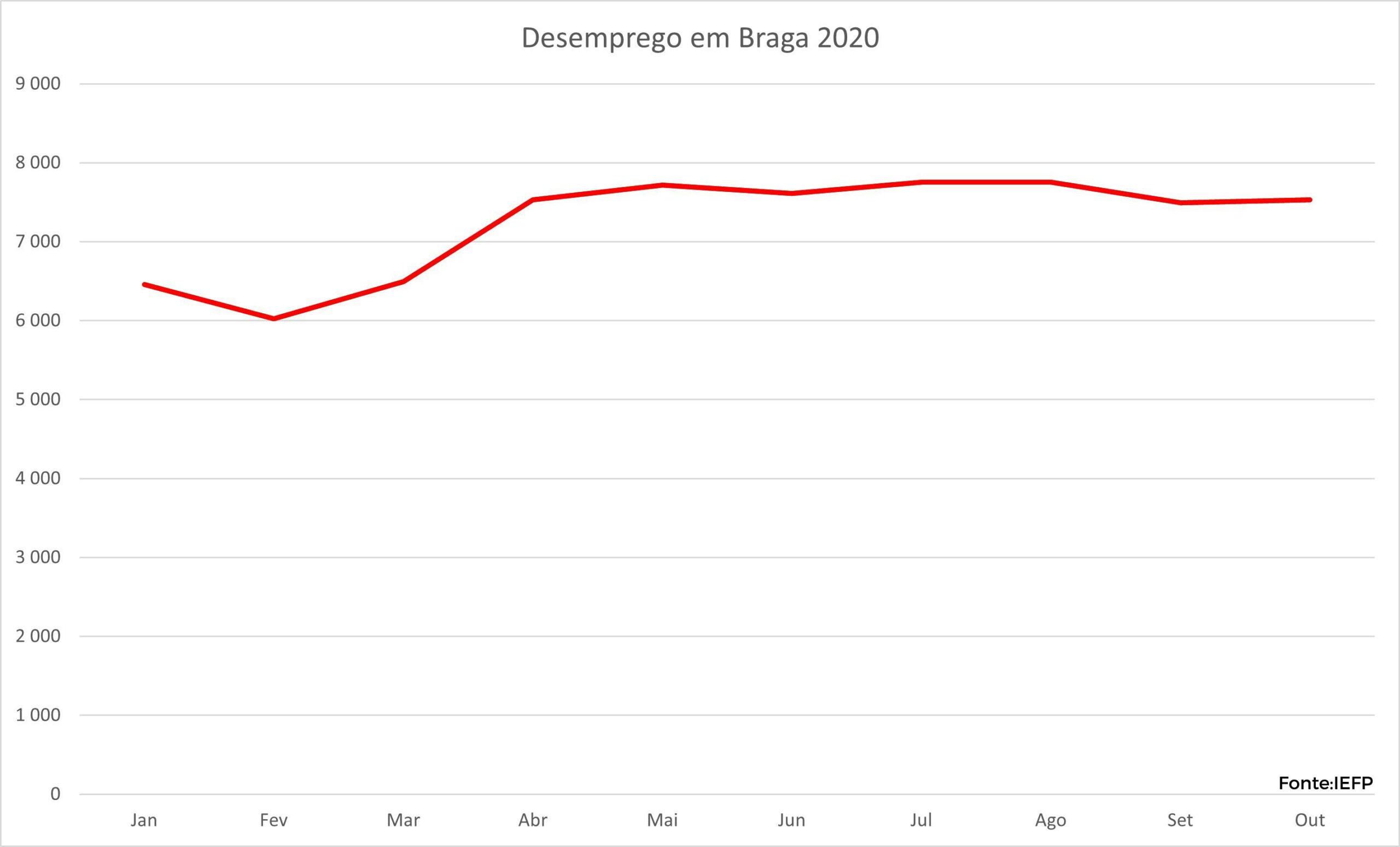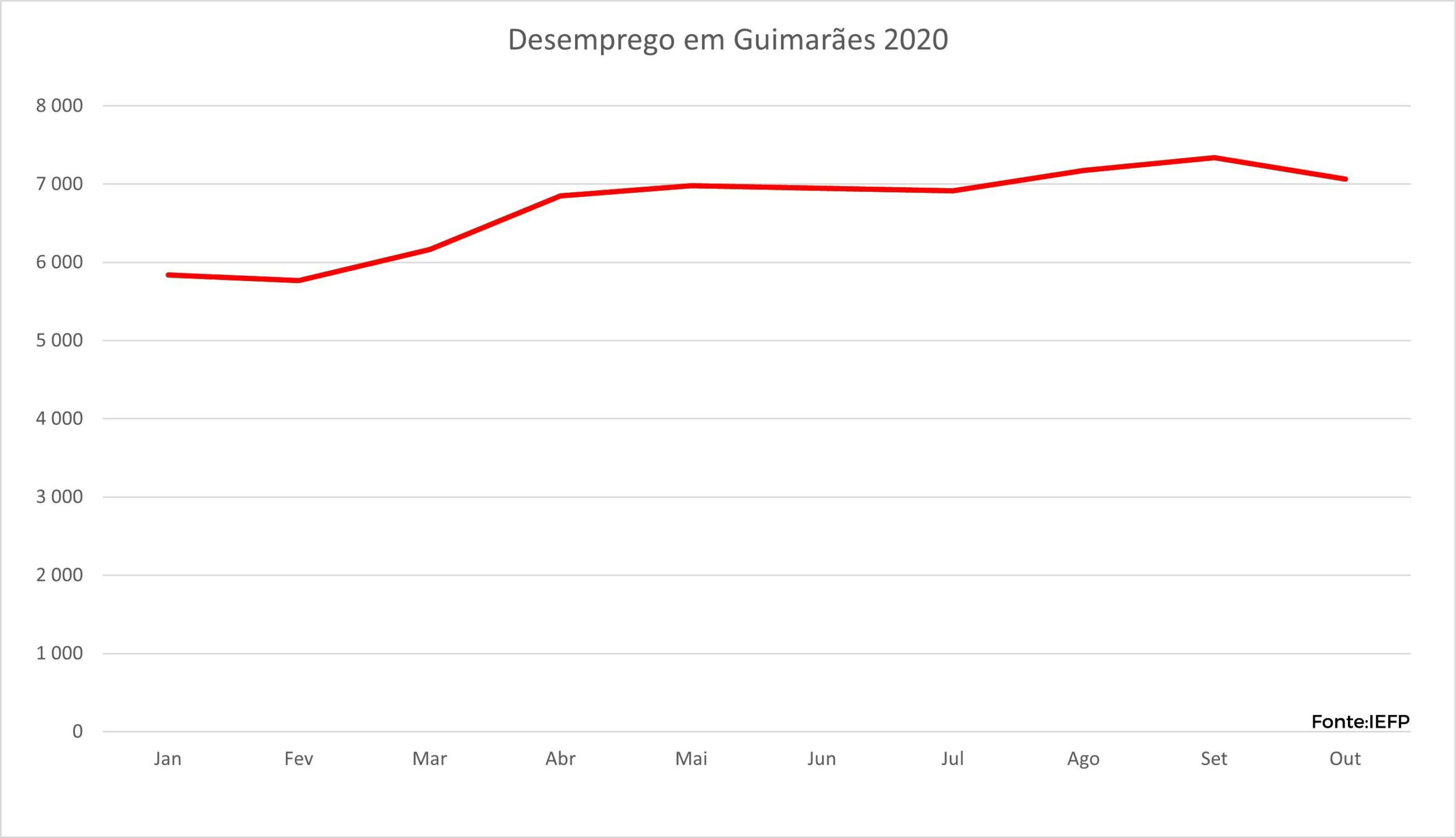For almost all of Minho, unemployment seems to have peaked in 2020 between May and June. The exception, among the large municipalities, is Guimarães, which reached the highest unemployed figure (7,337) in September. Guimarães is also the municipality where unemployment is highest in the region. All municipalities have more unemployed than in the same month of 2019, the variations range between 20 and 40%.
In the largest city in Alto Minho, Viana do Castelo, there were 1,702 unemployed in January this year. The number even started to drop, in February there were 79 less unemployed enrolled in the Institute of Employment and Professional Training (IEFP) but, in March, it skyrocketed. In the third month of the year, 2,094 people were registered with the municipality’s IEFP, 392 more than at the beginning of the year.
Since that time, which corresponds to the first restrictive measures to combat the pandemic – the first state of emergency was enacted on March 18 -, it was always rising, until May. In that month, the highest number of unemployed people registered this year, in Viana do Castelo, 2,791.

Source: IEFP
–
As of May, unemployment has been falling every month, there were 2,291 unemployed, in the last record, in October. This means a 34.6% upward variation compared to the first month of 2020, and a 39.1% increase when compared to the same month of 2019, when 1,646 unemployed persons were registered in Viana do Castelo. Due to the resident population aged between 15 and 64 years old, unemployment in Viana do Castelo is 4.1%, 3.1 percentage points less than the percentage projected by the National Statistics Institute for the national whole.
The municipality of Barcelos recorded, in the first month of 2020, 2,237 unemployed. As in Viana do Castelo, the number of unemployed registered with the IEFP started to fall in February (2,333). Also following what happened in Viana, in March the number of unemployed began to rise and peaked in May (3,231).


Source: IEFP
–
As of May, there was a reduction, which was only disturbed by a new peak in August. The municipality arrives in October with 2,777 unemployed, 24.1% more than at the beginning of 2020. This means that Barcelos has the lowest unemployment rate (3.4%) among the large municipalities in the Minho region. Compared to the same month of 2019, when there were 2,184 enrolled in the Barcelos IEFP, there was a variation of over 27.1%.
Famalicão had the biggest increase in the number of unemployed compared to January and October 2019
In Famalicão the rise in unemployment did not even wait for the first measures against the pandemic. The year started with a record of 3,412 unemployed and, in February, it had already risen to 3,510. In March there were 4,136 and it was always growing until reaching the maximum value registered so far, in 2020, 5,027, in May.


Source: IEFP
–
As of May, the number of unemployed people in Famalicão started to fall, but, as in Barcelos, it peaked again in August (4,942). Famalicão arrives in October, the last month of which there are records, with 4,731 unemployed, 1,319 more unemployed than in January, 296 less than in the worst month of the year. Famalicão registers an unemployment rate of 5.2%, ahead of Barcelos and Viana, the municipality is overtaken by Braga and Guimarães. In comparison with the month of October 2019, in which there were 3,338, there is a variation of more 41.7%. Regarding the figures for the first month of the year, the October record means a variation of 37.6% more, in absolute numbers there are more 1,319 unemployed.
In Braga and Guimarães, unemployment figures behave differently from other Minho municipalities. In Braga because, after starting to rise, in March, the numbers have remained constant upward, with small variations up and down. In Guimarães, in contrast to what happened in Viana do Castelo, Barcelos and Famalicão, the peak of the unemployment curve was only reached in September (7,337).


Source: IEFP
–
The Braga IEFP registered 6,455 unemployed in the municipality in January. As in other counties, in February the number dropped to 6,020 and, similarly to what happened in other territories, in March, it started to rise. However, since crossing the barrier of 7,530 unemployed in April, the municipality has remained at these values: April (7,533), the highest in May (7,714), June (7,613), July (7,551), August ( 7,554), September (7,490) and October (7,531). Unlike the other counties, where the number of unemployed people is lower now than in the months of May or June – minus 354, in Barcelos, minus 296, in Famalicão – in Braga, the reduction was smaller, only 183 less than in May and two less than in April. In October last year, 6,298 unemployed were registered in the municipality of Braga, the variation, in October 2020, is more than 1,233, that is, 19.5% more. Braga has the second highest unemployment rate in the region, among the municipalities in this comparison, 5.9%. Even so, the municipality has an unemployment rate 1.6 percentage points below the figure projected by INE for the country.
Guimarães has the highest unemployment rate in the region
In Guimarães, the year started with 5,841 unemployed enrolled in the Employment Center, 59 less than in the same month of the previous year. In the second month of the year, as in almost all other municipalities, unemployment was falling, there were 5,770 unemployed people in Guimarães, in February. As in most cases, the numbers started to rise from March (6,166) and peaked in May (6,981) but, unlike what happened in other counties, this figure was not the highest of the year. In the following two months, June and July, unemployment fell, however, after reaching 6,916 in July, it rose again in August (7,178) and reached the highest value of the year in September (7,337).


Source: IEFP
–
Between September and October unemployment fell again in Guimarães, in the last registration there are 7,065 enrolled in the IEFP, 1,224 more than in the beginning of 2020, a variation of another 20.9%. This value means, depending on the resident population of working age, that there is an unemployment rate of 6.9% in the municipality, the worst of the large municipalities of Minho. When comparing the month of October 2020 with the same month of the previous year, the variation in unemployment is 25.5%, that is to say another 1,439 unemployed people.
In relation to people looking for a first job, the number is higher, in all municipalities of Minho, both in comparison with the first month of the year, as compared with the same month of the previous year.
INE confirms a fall in unemployment in September and October in the entire territory
According to figures released on November 30, by INE, the unemployment rate in the country dropped to 7.9% in September, 0.2 percentage points less than in August and 1.4 points more than in the same month in 2019, which is in line with the reduction in the number of enrolled in the Minho Employment Centers.
According to the INE projections, the provisional data also point out that the unemployment rate (according to the International Labor Organization concept) continued to fall in October, to 7.5%, 0.4 percentage points less than in the previous year. previous month and one percentage point more than in the same month of 2019.


Source: IEFP
–
Analyzing the impact of the covid-19 pandemic on the results of the Employment Survey, INE states that it is “visible in the definitive results of September (central month of the moving quarter that covers August, September and October), when compared with the values of the month (August), the increase in the employed population and the decrease in the unemployed and inactive population ”.
The youth unemployment rate was estimated at 23.9% in October. This corresponds to a decrease of 0.4 percentage points in relation to the September 2020 rate. Among the large municipalities of Minho, however, there was only a decrease in the number of people looking for their first job, between September and October, in Viana do Castelo, although this indicator does not correspond exactly to youth unemployment (unemployed between 15 and 24 years old).
INE recalls that public health measures taken since mid-March “affected the normal functioning of the labor market and, consequently, the monthly estimates of employment and unemployment”. The temporary closure of several companies, restrictions on the free movement of people and the closing of schools, resulting in parents staying at home to care for their children. These measures and the layoff caused distortions in the way people are classified statistically in relation to their situation in relation to work.
“People previously classified as unemployed and people who effectively lost their job were, from a statistical point of view, classified as inactive if they did not make an active job search, due to restrictions on mobility, the reduction or even interruption of normal channels of employment. information on job offers as a result of the partial or even total closure of a very significant proportion of companies ”, informs INE.
Even people who were previously classified as employed may have “fallen” into the group of unemployed or inactive, according to the criteria of the International Labor Organization. This may have been the case for people who have been absent for more than three months from their work and who, at the same time, have received less than 50% of their usual salary.
INE points out that this analysis corresponds to a moment for the economy to reopen. With “the gradual process of deflation started in May, it was possible to reopen several economic activities and, in the months covered by this highlight, there is no obligation of social isolation as restrictive as before, this will have enabled the fulfillment of the criteria of active job search. and availability to start work, essential for the transition between the inactive population and the unemployed population ”.
On November 8, a new state of emergency was decreed and, in the meantime, new restrictive measures. “Compared to the state of emergency enacted in March, these measures had a lesser impact on economic activities, the free movement of people and the availability to work due to the maintenance of classroom activities”, analyzes INE.
–

